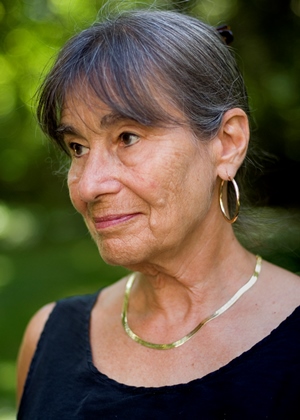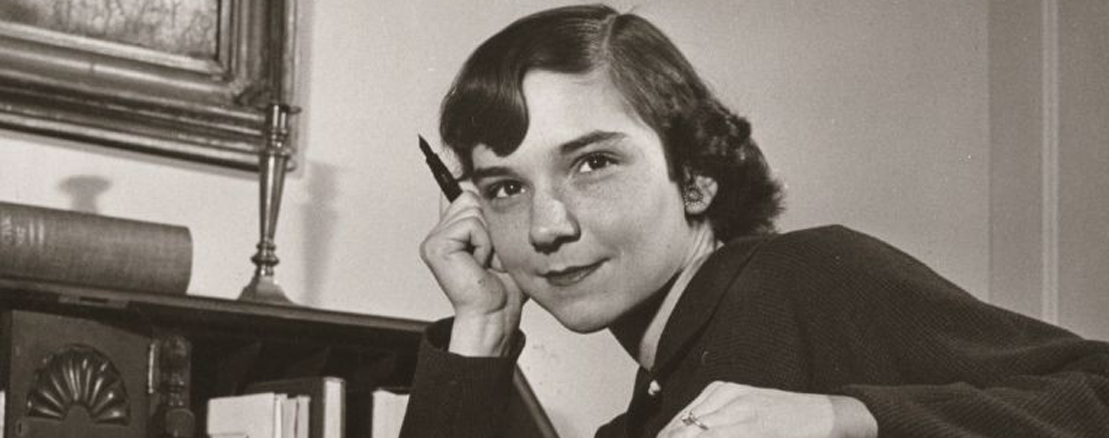During A Celebration of Women’s Poetry, the first open-mic reading in the short history of the Conversations @ Efroymson series, the forum matched the content. As much as the words off the page were empowering, so too was the sight of tenured professors trading notes with undergrads about which poetry collection to pick up next. Continue reading
‘Fiercely honest’ poet visits Tuesday
 American poet and scholar Alicia Ostriker is Butler’s next visiting writer. The woman once called “America’s most fiercely honest poet” by Joel Brouwer of Progressive will be giving a reading as part of the Visiting Writers Series October 8 at 7:30 p.m. in the Clowes Hall Krannert Room. Amongst an almost innumerable list of honors and awards, Ostriker is a two-time National Book Award finalist, a Guggenheim fellow, and her 2010 book of poetry The Book of Seventy won the National Jewish Book Award in poetry as well as the Paterson Award for Sustained Literary Achievement.
American poet and scholar Alicia Ostriker is Butler’s next visiting writer. The woman once called “America’s most fiercely honest poet” by Joel Brouwer of Progressive will be giving a reading as part of the Visiting Writers Series October 8 at 7:30 p.m. in the Clowes Hall Krannert Room. Amongst an almost innumerable list of honors and awards, Ostriker is a two-time National Book Award finalist, a Guggenheim fellow, and her 2010 book of poetry The Book of Seventy won the National Jewish Book Award in poetry as well as the Paterson Award for Sustained Literary Achievement.
Ostriker’s poetry and nonfiction are most deeply entrenched in her Jewish roots and feminist leanings, but she is unafraid to tackle war, politics and environmental issues. Her fourth book The Mother-Child Papers juxtaposes the birth of her son during the Vietnam War with the Kent State shootings that happened only weeks later, and her recent poem published in Poets for Living Waters, “Gaia Regards Her Children,” opens with the line, “Ingratitude after all I have done for them ingratitude.” Continue reading
‘Fiercely honest’ poet visits Tuesday
 American poet and scholar Alicia Ostriker is Butler’s next visiting writer. The woman once called “America’s most fiercely honest poet” by Joel Brouwer of Progressive will be giving a reading as part of the Visiting Writers Series October 8 at 7:30 p.m. in the Clowes Hall Krannert Room. Amongst an almost innumerable list of honors and awards, Ostriker is a two-time National Book Award finalist, a Guggenheim fellow, and her 2010 book of poetry The Book of Seventy won the National Jewish Book Award in poetry as well as the Paterson Award for Sustained Literary Achievement.
American poet and scholar Alicia Ostriker is Butler’s next visiting writer. The woman once called “America’s most fiercely honest poet” by Joel Brouwer of Progressive will be giving a reading as part of the Visiting Writers Series October 8 at 7:30 p.m. in the Clowes Hall Krannert Room. Amongst an almost innumerable list of honors and awards, Ostriker is a two-time National Book Award finalist, a Guggenheim fellow, and her 2010 book of poetry The Book of Seventy won the National Jewish Book Award in poetry as well as the Paterson Award for Sustained Literary Achievement.
Ostriker’s poetry and nonfiction are most deeply entrenched in her Jewish roots and feminist leanings, but she is unafraid to tackle war, politics and environmental issues. Her fourth book The Mother-Child Papers juxtaposes the birth of her son during the Vietnam War with the Kent State shootings that happened only weeks later, and her recent poem published in Poets for Living Waters, “Gaia Regards Her Children,” opens with the line, “Ingratitude after all I have done for them ingratitude.” Continue reading
Lerner interviews poet Aaron Belz
MFA nonfiction student Susan Lerner‘s interview with Aaron Belz “Cartographer of Word Galaxies” is up on The Believer‘s (a McSweeney‘s affiliate) online presence, The Believer Logger. Lerner and Belz touch upon the absurdity of words, the inherent ironies of consumer product marketing, Belz’s balance (or lack thereof) of poetry and comedy, and his complete and total disinterest in writing fiction. Belz writes, “I don’t see why fiction is necessary when we have real life.” Despite that smackdown, the interview is recommended reading for poets and prosers alike. Continue reading
Luckie’s genre-bender featured in lit mag’s debut
 You can find second-year MFA fictioneer Tom Luckie among the e-pages of the debut issue of online lit mag Atlas & Alice. His hybrid flash piece “Works Cited from Our Family Vacation to Colonial Williamsburg” is published alongside the likes of Sam Martone and Robert Vivian. Luckie does a lot of work with form, and this particular piece is a charming, funny, slightly violent glimpse into the classic American family roadtrip– condensed into a properly-formatted Works Cited page. Read it here.
You can find second-year MFA fictioneer Tom Luckie among the e-pages of the debut issue of online lit mag Atlas & Alice. His hybrid flash piece “Works Cited from Our Family Vacation to Colonial Williamsburg” is published alongside the likes of Sam Martone and Robert Vivian. Luckie does a lot of work with form, and this particular piece is a charming, funny, slightly violent glimpse into the classic American family roadtrip– condensed into a properly-formatted Works Cited page. Read it here.
Atlas & Alice is a gently experimental lit mag that takes its name from two Large Hadron Collider experiments. Its editors are especially friendly to science-y work, prose poems, flash fiction, or any kind of literature that exists at an intersection: “that kind of intersection–in the case of our title, between literature and science–that interests us. We like things that meet, conjoin, dance, rebound, explode. Bring two things together; see what happens.”
On a personal note, I’d just like to share how hard it is to not write the headline, “Luckie gets lucky,” because that not only has unfortunate connotations, but also implies rather rudely that Tom’s piece isn’t fantastic, just lucky. His name invites all sorts of puns, but it really is just a well-concealed trap where wordplay goes to die. Anyway, give Tom’s hand a shake if you happen upon him around town.
An evening of women’s poetry
Co-sponsored by the Butler English Department and Gender, Women & Sexuality Studies,
A Celebration of Women’s Poetry will open the Conversations @ Efroymson series on September 24 at 4PM. The event is open-mic, so all Butler students, faculty, and staff are invited to attend— and especially to share.
Readers are asked to share a favorite poem written by a woman, prefacing or following it by speaking briefly about the piece; perhaps the poem’s impact, or how it moves them. I reckon it’ll go a little something like this:
I bought Vol. 9 of Ninth Letter on a lark. I had no prior experience with the mag, it was a buy-one-get-something deal that charmed me. Cracking open the magazine, it was gorgeous. I paged through it without actually reading, stopping at what I can only describe as the ‘splash page’ for a series of seven poems by Paisley Rekdal: odes to Mae West. What a neat concept, I thought, so I dug in. I was immediately smitten with Rekdal’s langauge, the risky verve with which she composed, the message behind her work—espousing all that is quintessentially Mae.
The first poem, “You’re,” speaks of young girls emulating West’s mannerisms, but the final poem, “Confessional,” finds a more mature speaker instead internalizing West. It’s frank, free, an unapologetic sort of manifesto. It opens (each poem does) with an epigraph courtesy of Miss West: “The only good girl to make history was Betsy Ross and she had to stitch up a flag to do it.”
What gal is safe from being slut, tether of lies that leash
a pretty girl through life? Shamed in school by those who claimed
we’d each undone the captains of our football teams—
Shunned, despised, how, like dogs, we learned to heel.
How we cringed and whined; how we pissed ourselves
pretending to be good. O, but to insist beneath the artificial rules,
a realer artifice named “I” might thrive, one capable as Mae
of jokes so bright they’d split the world to its brutal truth.
It wasn’t that we were vile; we weren’t sluts enough. Reader:
I should have taken that boy out back and fucked
the life out of him. Forget it. I’ve another forty years to go.
I plan to be filthy. I plan to be low. (Laugh, reader,
so that “I” can last.) I’m writing the story of a life. Listen.
It’s about a girl who lost her reputation. And never missed it.
A Celebration of Women’s Poetry is slated to run from 4-6PM on September 24 at the Efroymson Center for Creative Writing. If you’re interested in reading, sign up with Efro-Master Chris Speckman (cspeckman@butler.edu) as soon as possible. If you’d like to pass around the electronic event poster, it is available here.

